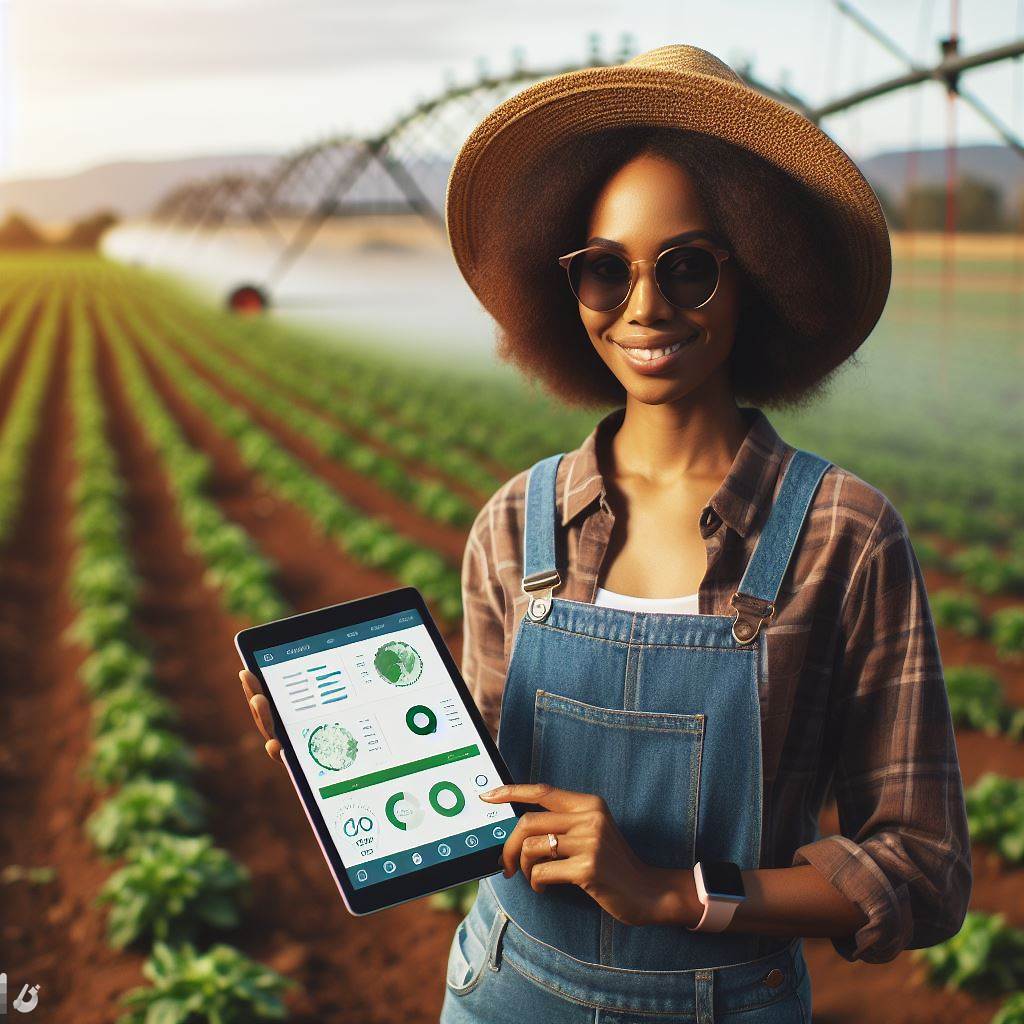Climate-Smart Agri-Tech Solutions
Last Updated on March 5, 2024
Introduction
Importance of addressing climate change in agriculture
Climate change poses a formidable threat to global agriculture, demanding innovative solutions.
Extreme weather events, shifting growing seasons, and unpredictable rainfall patterns jeopardize food security worldwide.
Brief overview of climate-smart agriculture
Enter climate-smart agri-tech solutions—a beacon of hope in this crisis.
These technologies integrate digital tools, precision farming, and sustainable practices to enhance resilience.
By optimizing resource use, reducing emissions, and adapting to climate variations, these solutions revolutionize traditional farming methods.
As the planet grapples with the challenges of a changing climate, embracing climate-smart agriculture becomes imperative.
This section explores the pivotal role of agri-tech in mitigating climate risks and fostering sustainable, resilient farming systems.
Let’s delve into the transformative world of innovative technologies shaping the future of agriculture.
Definition and Benefits of Climate-Smart Agri-Tech Solutions
Definition of climate-smart agri-tech solutions
Climate-smart agri-tech solutions refer to the utilization of technology and innovation in agricultural practices to increase productivity, resilience, and sustainability while adapting to and mitigating climate change.
These solutions integrate modern technologies, data-driven approaches, and smart farming techniques to optimize agricultural outcomes.
The benefits of implementing such solutions
Increased food production and food security
Climate-smart agri-tech solutions enable farmers to produce higher yields and diverse crops by optimizing inputs such as water, fertilizers, and seeds.
This increases overall food production, thereby enhancing food security for growing populations and ensuring adequate supply.
Improved resilience to climate change
These solutions help farmers adapt to changing climate patterns and extreme weather events.
By utilizing data-driven insights, farmers can make informed decisions regarding crop selection, planting schedules, and irrigation practices.
This improves resilience by reducing crop losses and maintaining agricultural productivity, even in the face of adverse climate conditions.
Mitigation of greenhouse gas emissions
Climate-smart agri-tech solutions contribute to greenhouse gas (GHG) emission reduction by minimizing the use of synthetic inputs like fertilizers and pesticides.
Precision agriculture techniques, such as sensor-based irrigation and nutrient management systems, optimize resource utilization, leading to reduced emissions.
Additionally, the adoption of renewable energy sources in farm operations further decreases the carbon footprint of agriculture.
Conservation of natural resources
By implementing climate-smart agri-tech solutions, farmers can conserve natural resources such as land, water, and biodiversity.
Advanced irrigation systems, such as drip irrigation and micro-sprinklers, reduce water wastage.
Precision farming techniques prevent soil degradation and erosion, preserving the land’s fertility.
This sustainable approach safeguards ecosystems and minimizes the environmental impact of agriculture.
These benefits emphasize the transformative potential of climate-smart agri-tech solutions in addressing the challenges posed by a changing climate while ensuring sustainable agricultural practices.
These innovations not only support farmers’ livelihoods but also contribute to global efforts in achieving food security, climate resilience, and environmental sustainability.
By harnessing technology and adopting climate-smart approaches, agriculture can become a powerful tool in the fight against climate change and building a resilient future.
Read: Cost Reduction in Farming
Examples of Climate-Smart Agri-Tech Solutions
Climate change poses a significant threat to agriculture, affecting food security and livelihoods worldwide.
In response to this challenge, the agriculture sector has been embracing innovative technologies and solutions to mitigate the impact of climate change on farming practices.
Climate-Smart Agri-Tech Solutions are among the key advancements in the field, promoting sustainable and climate-resilient agricultural practices.
Precision agriculture
Precision agriculture is one such solution that utilizes sensors and remote monitoring techniques to enhance farming precision.
These technologies provide real-time data on soil moisture, temperature, and nutrient levels, allowing farmers to make data-driven decisions for optimal resource management.
By doing so, farmers can reduce fertilizer and water usage, minimize environmental impacts, and increase overall productivity.
Climate-resilient crop varieties
Another important aspect of Climate-Smart Agri-Tech Solutions is the development of climate-resilient crop varieties.
Through various breeding techniques, scientists have been able to develop heat and drought-tolerant crops that are better adapted to changing climatic conditions.
Additionally, the utilization of genetically modified organisms (GMOs) has further enhanced the resilience and productivity of crops.
These genetically modified varieties possess traits that make them more resistant to pests, diseases, and extreme weather events.
Farm management software
Farm management software is also playing a crucial role in achieving climate-smart agriculture.
These software tools provide farmers with efficient ways to monitor and optimize their agricultural operations.
From tracking crop growth and yield to managing inventory and financial records, farm management software improves overall efficiency and enables better decision-making.
Furthermore, integrating weather data into such software enables farmers to plan and adjust their farming practices according to upcoming weather patterns, mitigating potential risks and maximizing yields.
Smart irrigation systems
Smart irrigation systems are another climate-smart solution in agriculture.
These systems ensure efficient water usage through automated processes such as soil moisture sensors and weather data integration.
By incorporating real-time weather forecasts into irrigation scheduling, farmers can optimize water usage and minimize water wastage.
This not only conserves water resources but also reduces energy consumption and lowers operational costs.
In fact, Climate-Smart Agri-Tech Solutions offer promising strategies for mitigating the impact of climate change on agriculture.
Precision agriculture, climate-resilient crop varieties, farm management software, and smart irrigation systems are just a few examples of these innovative solutions.
By embracing these technologies, farmers can adapt and thrive in the face of climate change while minimizing environmental impacts and ensuring sustainable food production for the future.
Read: Emerging Markets in Agriculture

Adoption Challenges and Opportunities
Lack of awareness and education among farmers
The challenges and opportunities associated with the adoption of climate-smart agri-tech solutions are interconnected.
Lack of awareness and education among farmers is a significant obstacle that hinders the widespread adoption of these solutions.
Without knowledge of the benefits and potential of these technologies, farmers may be hesitant to invest in them.
High upfront costs and limited access to financing
Additionally, the high upfront costs of implementing agri-tech solutions pose a barrier to adoption.
Many farmers, especially small-scale and resource-limited farmers, may struggle to afford the initial investment required for these technologies.
Limited access to financing furthers the financial challenges faced by farmers.
Need for supportive policies and regulations
Supportive policies and regulations are crucial in overcoming these challenges.
Governments and regulatory bodies must recognize the importance of agricultural technology solutions designed for climate resilience and create a favorable environment for their adoption.
Incentives, subsidies, and financial support can help alleviate the financial burden farmers face.
Potential for collaboration between agri-tech companies and farmers
Collaboration between agri-tech companies and farmers is vital in driving adoption.
Agri-tech companies should focus on building relationships and partnerships with farmers, providing them with the necessary guidance, training, and technical support.
This collaboration will enhance farmers’ understanding and confidence in using agricultural technology solutions designed for climate resilience.
Opportunities for partnerships with research institutions and government agencies
Moreover, partnerships between agri-tech companies, research institutions, and government agencies can accelerate innovation and adoption.
Research institutions contribute to the development of cutting-edge technologies, while government agencies have the power to influence policies and regulations that facilitate adoption.
In short, the adoption of climate-smart agri-tech solutions faces various challenges, including lack of awareness, high upfront costs, and limited access to financing.
However, there are also significant opportunities for collaboration between agri-tech companies, farmers, research institutions, and government agencies.
Overcoming these challenges and seizing the opportunities will require concerted efforts from all stakeholders involved.
Read: Innovative Agri Business Models
Case Studies and Success Stories
Successful implementation of climate-smart agri-tech solutions
- Successful implementation of climate-smart agri-tech solutions has had a significant impact on crop yields and quality.
- Farmers utilizing these solutions have observed a reduction in water and energy consumption, leading to sustainable practices.
- These technologies have also brought improvements in the profitability of agricultural businesses, ensuring long-term sustainability.
Different regions or countries
- In the United States, the use of precision farming techniques, such as soil sensors and weather forecasting systems, have positively impacted crop yields and resource management.
- In India, farmers have benefitted from the utilization of mobile applications that provide real-time market information and weather updates, facilitating better decision-making.
- Similarly, in Kenya, the adoption of remote sensing technologies and drip irrigation systems has resulted in increased productivity and reduced water consumption.
Impact on crop yields and quality
One successful case study comes from a farm in California that implemented climate-smart agri-tech solutions.
By utilizing precision farming techniques, such as satellite imagery and data analytics, the farm was able to identify specific areas of their fields that required attention.
This allowed them to optimize their use of fertilizers and pesticides, leading to improved crop yields and higher quality produce.
The farm saw a 30% increase in profits and received positive feedback from customers regarding the taste and appearance of their crops.
Reduction in water and energy consumption
Another inspiring case study emerges from a region in Australia that faced severe water scarcity.
By introducing agri-tech solutions like drip irrigation systems and weather monitoring devices, farmers were able to significantly reduce their water consumption by up to 40% while maintaining optimal crop growth.
Additionally, the incorporation of renewable energy sources, such as solar-powered pumps, allowed them to decrease their reliance on fossil fuels, contributing to environmental sustainability.
Improvements in profitability and sustainability
A notable example comes from a cooperative of small-scale coffee farmers in Colombia.
By employing agri-tech solutions like blockchain technology, the cooperative improved supply chain transparency and connected directly with international buyers, eliminating intermediaries.
This not only increased their profitability by fetching higher prices for their coffee but also enhanced the sustainability of their operations by promoting fair trade practices and supporting the economic development of the local community.
These case studies and success stories demonstrate the diverse benefits of agricultural technology solutions designed for climate resilience based on local conditions and requirements.
By showcasing the successful implementation of these solutions, the potential for wider adoption and replication in other regions becomes evident.
The positive impact on crop yields, resource management, profitability, and sustainability showcases the tremendous potential of agricultural technology solutions designed for climate resilience in addressing the challenges of agricultural production in a changing climate.
Read: Farm Management Best Practices
Uncover the Details: Branding Strategies in Agribusiness
Explore Further: Tech Solutions for Farm-to-Market Success
Gain More Insights: Smart Farming: IoT’s Role in Agriculture
Conclusion
A recap of the importance and benefits of climate-smart agri-tech solutions
These solutions play a crucial role in mitigating the effects of climate change on agriculture, ensuring food security, and reducing greenhouse gas emissions.
By implementing agricultural technology solutions designed for climate resilience, farmers can increase their productivity and resilience to climate-related challenges.
These solutions also provide economic benefits by reducing input costs, improving market access, and creating new job opportunities.
To fully leverage the potential of agricultural technology solutions designed for climate resilience, it is essential for policymakers to create an enabling environment.
Investors need to recognize the long-term benefits and support the development and adoption of these solutions.
Additionally, farmers should be encouraged to embrace these technologies and receive the necessary training and support.
Continued research and innovation in the agri-tech sector are crucial to develop new and improved technologies.
This will enable farmers to address evolving climate challenges and adapt to changing environmental conditions.
It is imperative for all stakeholders to collaborate and invest in climate-smart agri-tech solutions.
By doing so, we can build a resilient and sustainable agricultural sector that can effectively tackle climate change.
Together, let us embrace and support climate-smart agri-tech solutions for a better future.


